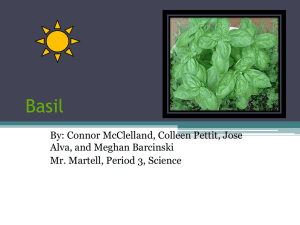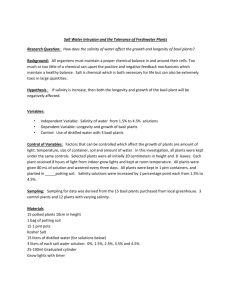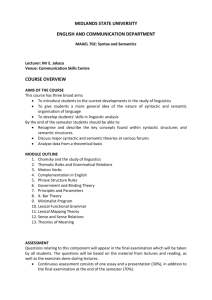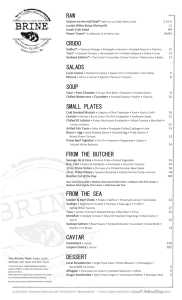Basil`s On Greek Literature and the Vocation of a Student.
advertisement
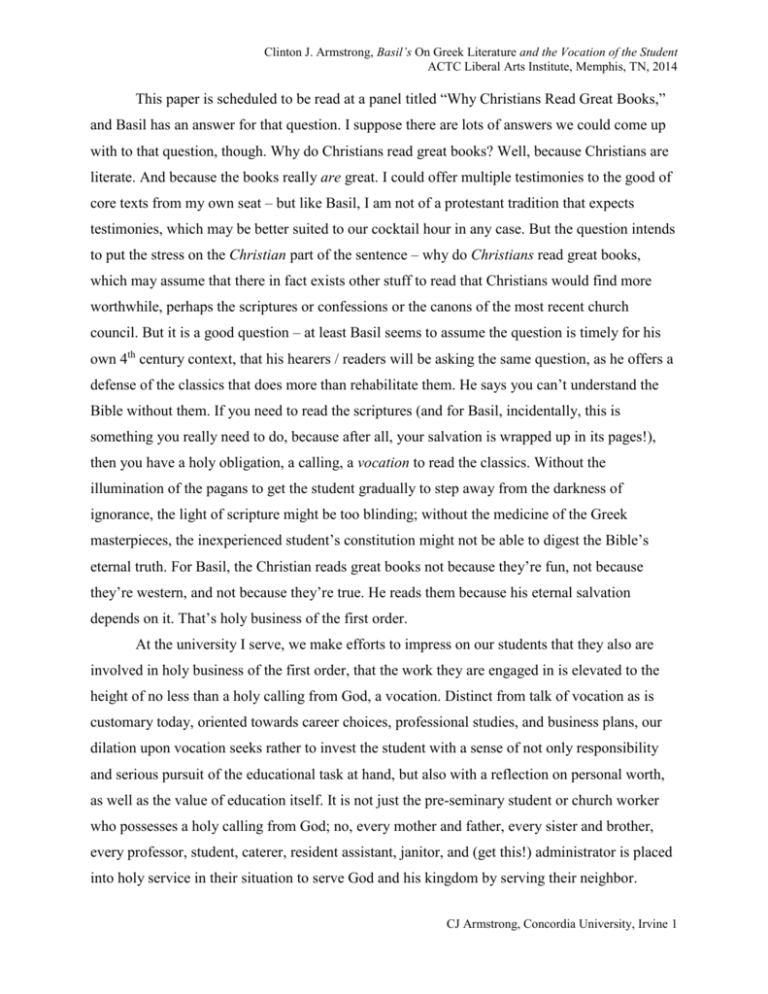
Clinton J. Armstrong, Basil’s On Greek Literature and the Vocation of the Student ACTC Liberal Arts Institute, Memphis, TN, 2014 This paper is scheduled to be read at a panel titled “Why Christians Read Great Books,” and Basil has an answer for that question. I suppose there are lots of answers we could come up with to that question, though. Why do Christians read great books? Well, because Christians are literate. And because the books really are great. I could offer multiple testimonies to the good of core texts from my own seat – but like Basil, I am not of a protestant tradition that expects testimonies, which may be better suited to our cocktail hour in any case. But the question intends to put the stress on the Christian part of the sentence – why do Christians read great books, which may assume that there in fact exists other stuff to read that Christians would find more worthwhile, perhaps the scriptures or confessions or the canons of the most recent church council. But it is a good question – at least Basil seems to assume the question is timely for his own 4th century context, that his hearers / readers will be asking the same question, as he offers a defense of the classics that does more than rehabilitate them. He says you can’t understand the Bible without them. If you need to read the scriptures (and for Basil, incidentally, this is something you really need to do, because after all, your salvation is wrapped up in its pages!), then you have a holy obligation, a calling, a vocation to read the classics. Without the illumination of the pagans to get the student gradually to step away from the darkness of ignorance, the light of scripture might be too blinding; without the medicine of the Greek masterpieces, the inexperienced student’s constitution might not be able to digest the Bible’s eternal truth. For Basil, the Christian reads great books not because they’re fun, not because they’re western, and not because they’re true. He reads them because his eternal salvation depends on it. That’s holy business of the first order. At the university I serve, we make efforts to impress on our students that they also are involved in holy business of the first order, that the work they are engaged in is elevated to the height of no less than a holy calling from God, a vocation. Distinct from talk of vocation as is customary today, oriented towards career choices, professional studies, and business plans, our dilation upon vocation seeks rather to invest the student with a sense of not only responsibility and serious pursuit of the educational task at hand, but also with a reflection on personal worth, as well as the value of education itself. It is not just the pre-seminary student or church worker who possesses a holy calling from God; no, every mother and father, every sister and brother, every professor, student, caterer, resident assistant, janitor, and (get this!) administrator is placed into holy service in their situation to serve God and his kingdom by serving their neighbor. CJ Armstrong, Concordia University, Irvine 1 Clinton J. Armstrong, Basil’s On Greek Literature and the Vocation of the Student ACTC Liberal Arts Institute, Memphis, TN, 2014 This talk of holy callings urges students to see that the work of university education is sanctified by it being a facet of God’s overall work for the world, integrated wholly as his kingdom manifests itself in Church and Society. At a Christian church-related institution like our Lutheran campus, such a mission and ideological undercurrent is not surprising. Nor is the deliberate choice to offer courses in Core pairings such as freshman theology coupled with biology; freshman philosophy coupled with mathematics; sophomore history and literature working in tandem over four courses in two semesters to engage the big questions of What should we believe? How should we be governed? What is the nature of citizenship? But for all that, the bulk of the ancient texts we expect students to digest in history and literature might seem scandalous to one of a more puritan stripe, one who’d blush at a tale from Herodotus, turn apoplectic at a fragment of Sappho, and positively reel at a whiff of Ovid. It strikes me that on the one hand scholars of the Humanities are compelled always to have their tools sharpened and at the ready, to offer a winsome defense of their discipline, particularly in a generation that would measure the worth of great-books curricula against the practical concerns of job placement and student debt. But on the other hand, how much more, for a Classicist at a church-related institution, the regents, donors, and mission orientation of which might at least grudgingly assent to a religious core, but reasonably question the more scurrilous bits of a secular one! I’m not often asked to offer an apologia for reading Homer, Virgil, Herodotus, or Euripides, but every once in a while I am – that’s the professional hazard of the Classicist – and so it’s not enough simply to read the texts and enjoy the texts and share the good of those texts with others. Some tool-sharpening is in order at the intersection of religious and secular cores. And I think that’s what Basil was dealing with in large part in his address To the Young Men on the Proper Use of Greek Literature. Grossly stated, Basil’s argument is that Homer and Hesiod need no rehabilitating – the classics are a mirror of the truth, so let’s get to reading them! A more finely tuned read reveals that Basil weaves in a theology of vocation that drives his hearer / reader to recognize that the best bits of the ancients are entirely consonant with the revelation of God in Christ, and therefore underscore the call to the boys in his care: rejection of the world with its pomps and passions, mortification of desire (especially for money and the luxuries they afford), and a seeking after Truth with a capital T. The call to Basil’s audience is to practice virtue in what they do and what they read, and so attain to the truth, which he calls a CJ Armstrong, Concordia University, Irvine 2 Clinton J. Armstrong, Basil’s On Greek Literature and the Vocation of the Student ACTC Liberal Arts Institute, Memphis, TN, 2014 road that will lead them to “that long, undying age, of the extent of which there is no limit for the mind of man to grasp, any more than there is of the life immortal.”1 But for all that, Basil yet sits uncomfortably in a curriculum that values reading great books. Because Basil’s approach is not just to read great books. Basil’s call is to read some of the great books. The bits that have value, anyhow. And the bits that have value are the bits that teach virtue. Not the scurrilous bits. Not the salacious stories. Not the teachings about the pagan gods and Herodotus’ lies about “Lydian gold-dust or gold-gathering ants.”2 He instructs his students: You should not unqualifiedly give over your minds to these men, as a ship is surrendered to the rudder, to follow whither they list, but that, while receiving whatever of value they have to offer, you yet recognize what it is wise to ignore. Accordingly, from this point on I shall take up and discuss the pagan writings, and how we are to discriminate among them.3 That discrimination looks for virtue, and certainly not anything that promotes a life of vice in luxury or greed. What counts here is not being well-read for the sake of being well-read or entertained, much less coming away with a comprehensive flavor of the Greek pagan world as a system to be imitated or respected, except insofar as it accords with truth consonant with scripture. Here virtue is key, and the student is directed to zero in on narratives of virtuous lives and didactic texts. Basil’s encouragement to read, combined with his salutary warning against the lies of pagan antiquity, is reminiscent of Socrates’ dilemma with poetry and philosophy, articulated for example in the extreme censorship of Plato’s Republic 2 and 3. But whereas Plato has Socrates describing a totalitarian utopia, Basil seems rather to be advocating a personal virtue, the payoff being eternal life, learned from the pages of scripture which become an open book through training in the virtues the pagans teach. What’s to account for the strain of censorship Basil supports? Have we here a bowdlerizer, setting blinders on students who might appreciate the classics? Much to the contrary, Basil’s own historical situation informs us that we ought to consider this entirely the other way round – that students of Christian curriculum, fresh in to a new school once the pagans have left town, ought not whine when further reading is added to their bibliography, when their master adds to what they initially expected to read, bidding them gaze in the mirror of the pagan classics. The world in which Basil and his students pursued their educational goals was a volatile one, in which schools were opened and closed, and curricula introduced or closeted, depending 1 Basil On Greek Literature 10 (trans. F.M. Padelford, 1902). Ibid., 9. The author claims that this is rather a low blow on Basil’s part. 3 Ibid, 1. 2 CJ Armstrong, Concordia University, Irvine 3 Clinton J. Armstrong, Basil’s On Greek Literature and the Vocation of the Student ACTC Liberal Arts Institute, Memphis, TN, 2014 which way the church / state wind might be shifting. The world of the fourth century was not simply the world of legitimization of Christianity, but the uncomfortable struggle between Christian educators and a standard ancient curriculum whose foundations were more than a millennium old, a curriculum Basil himself learned from at Caesarea and Constantinople, and finally in the 5 or 6 years he studied at Athens with his friend Gregory Nazianzus (and their peer Julian, later the Apostate). Even among Christians, his was an era of competing orthodoxies; Basil himself did not begin as an Athanasian confessing the homoousios of Christ’s godhead, but was converted from his Arian leanings to champion the cause of the Nicene Creed. In such a world, it would be common for teachers to have to make a defense of their agenda. From this perspective, it is important to read Basil not as a slicer and dicer of the standard curriculum for the last 750 years, but as a classical scholar who knows the good of the texts; not a bowdlerizer of dangerous banned books, but one who would plant his flag of reason against any who would dumb down emergent scholarship in a brave new world. Against such a backdrop, Basil’s theology of vocation encompasses more than the single goal of solitary virtue, one limiting the student to anything but continued indoctrination leading to personal piety and salvation. The urgency of historical context invites us to read between the lines to a more comprehensive purpose. He is not telling his students not to read certain bits of the classics as much as he is telling them to read the classics – and that, to prepare them for a long life, not just in eternity, but in the here-and-now of 4th century Cappadocia, when the next wave of pagan patronage may hit at any moment, and the philosophers will have to demonstrate that they’ve got their tools sharpened to engage with a world conversant with Hesiod and Homer and everything after. We cannot go so far as to say, however, that Basil is interested in some form of “intellectual evangelism,” as much as he is in equipping students to read virtuous things, and we may go so far as to say, read virtuously. That is, the religious scholar doesn’t read simply to learn the virtues – pagans have them (obviously), and so do Christians. The religious scholar reads to become better – and to realize a better world. The scholar of any persuasion yet lives in a real world populated by pagans and Christians, a world in which Basil envisions at least that, though there may be vast disagreements related to worldview, thinkers of both persuasions yet can read at table together and inform education, and the state. Though the Cappadocian father is remembered as the father of eastern monasticism, he wasn’t training monks-to-be with this core CJ Armstrong, Concordia University, Irvine 4 Clinton J. Armstrong, Basil’s On Greek Literature and the Vocation of the Student ACTC Liberal Arts Institute, Memphis, TN, 2014 text. He is talking to people who will engage a pagan world, not only in school, but also in an empire ruled by administrators who may not be orthodox (witness Arian emperors like Valens, whom Basil famously crossed), much less Christian (Julian and Basil exchanged fiery repartee; cf. Basil’s Letters 6, 40, 41). The real-world demands of Basil’s 4th century included more than students able to read the Bible. It required scholars able to stand up on common ground amid shifting orthodoxies, shifting loyalties east and west, and shifty people at the top of both church and state. The educated statesman is one who is able to quote both Paul and Pericles, both Jesus and Julius Caesar. The educated statesman is one who is able to match the rhetoric of his correspondents quote for quote, well-versed in the classical topoi of the schools – never to be used in court, mind you, but to ensure that communication is clear and civil. The educated statesman is one charged, obligated, called with a holy vocation, to move a society in a virtuous direction, not through some culturally accepted authority of divine revelation, but rather with tools forged in the skepticism of the Greek philosophers, the work ethic of a Hesiod, the savvy sentences of a Solon, and perhaps even the wit, charm, and wry observation of an Aristophanes. What about us? Do we have a similar need to engage a society with truth, skeptically rising above cultural preferences to find some common ground in a capital-T Truth? Perhaps it is too ambitious a thing to imagine that a similar insistence on classical liberal arts training in our own North American, 21st century context, can forge a means to shape society; perhaps there exists too little common ground in modern life for an untaught or unteachable world to accept. I’ll strive to be optimistic here nevertheless. But realistically: how about across universities? Do we have common ground across both public and private secular institutions as well as those that are church-related? Are we able to sit at the table together, holding in common a way to read the great conversation virtuously? And if there is hesitation about our ability or desire to do such, with whom does the onus rest to engage the conversation? Is the intersection of religious and secular cores to be a matter of evaluating one as better, different, equivalent? Or to aim at synergy, to a common goal? Whatever the answer, some tool-sharpening is in order, and work is involved. Here also Basil has words to share with us, at the very end of his essay. He says to his students, Now as the sick are of three classes, according to the degrees of their sickness, may you not seem to belong to the third, or incurable, class, nor show a spiritual malady like that of their bodies! For those who are slightly indisposed visit physicians in person, and those who are seized by violent sickness call physicians, but those who are suffering from a hopelessly CJ Armstrong, Concordia University, Irvine 5 Clinton J. Armstrong, Basil’s On Greek Literature and the Vocation of the Student ACTC Liberal Arts Institute, Memphis, TN, 2014 incurable melancholy do not even admit the physicians if they come. May this now not be your plight, as would seem to be the case were you to shun these right counsels!4 This brings us back to the vocation of the student – a holy calling requiring ultimately that the student be conscious of himself. With undergraduates, I have described this final analogy of Basil’s sick, very sick, and very, very sick, as three classes of students: the eager, the hopeful, and the doomed. Which kind of student are you, I ask classes every term. Are you still making appointments with the doc, or are they wheeling you in to the ER, or should we just call the undertaker? But let’s turn the table for a moment. Which kind of scholar are you? Are you a virtuous reader? Does this late antique Classicist’s analogy hold water for us who are the purveyors of the liberal arts? Have we grown lax, lazy, lethargic at the prospect of making the uncomfortable step to an alien canon, a core not our own, a text tradition whose worldview may alter the way we’ve prepped our courses and run our scholarship for too many years to change? At the very least, in addressing the malady, if Basil would be our teacher (and he should be), what medicine would he have us take? I think the answer is clear. The classics. The garland of the ancients. The foliage adorning the tree of life that shades the fruit of divine truth. The tools – the only tools in our toolbox worth keeping sharp, perhaps – the only tools we have are the texts. Leave it to a Classicist to go back to the text. But here in fact is common ground at the intersection of religious and secular cores. Basil affirms it, and we do well to consider it for ourselves across higher ed: common ground, if not to effect radical change in society in this generation, at least texts transmitting the best ideas to preserve for another generation, to help them survive the undertows of the next big cultural wave. If such a vocation is not worthy of being called sacred, would you please help me out and tell me what is? 4 Ibid, 10. CJ Armstrong, Concordia University, Irvine 6
